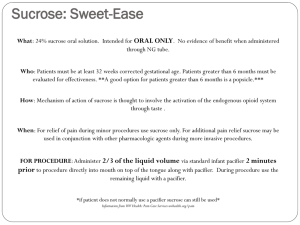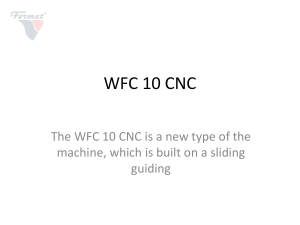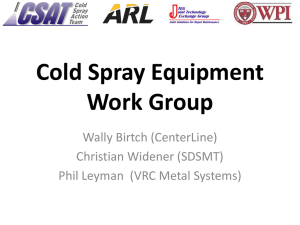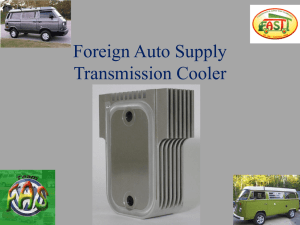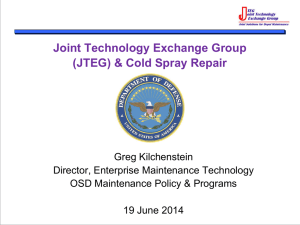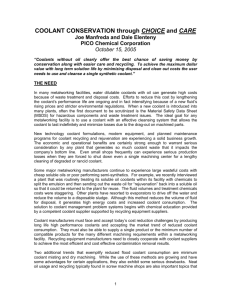Vapocoolant
advertisement
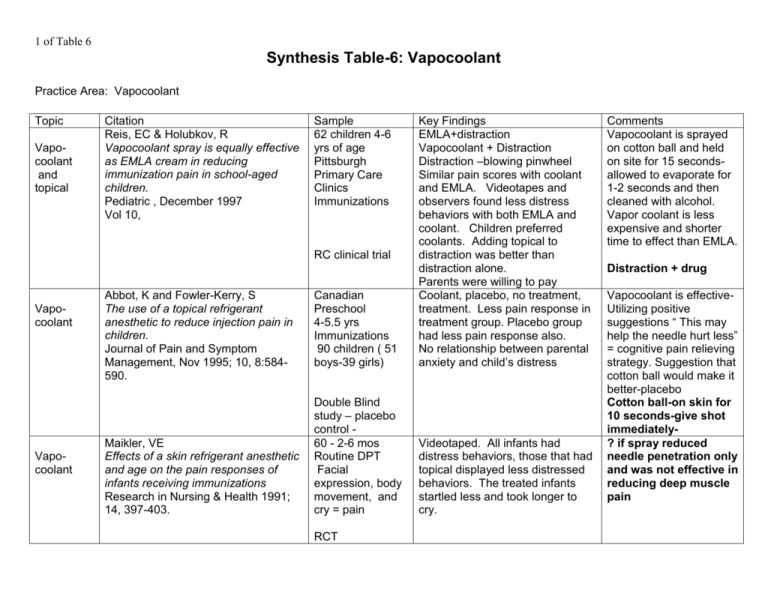
1 of Table 6 Synthesis Table-6: Vapocoolant Practice Area: Vapocoolant Topic Vapocoolant and topical Citation Reis, EC & Holubkov, R Vapocoolant spray is equally effective as EMLA cream in reducing immunization pain in school-aged children. Pediatric , December 1997 Vol 10, Sample 62 children 4-6 yrs of age Pittsburgh Primary Care Clinics Immunizations Canadian Preschool 4-5.5 yrs Immunizations 90 children ( 51 boys-39 girls) Key Findings EMLA+distraction Vapocoolant + Distraction Distraction –blowing pinwheel Similar pain scores with coolant and EMLA. Videotapes and observers found less distress behaviors with both EMLA and coolant. Children preferred coolants. Adding topical to distraction was better than distraction alone. Parents were willing to pay Coolant, placebo, no treatment, treatment. Less pain response in treatment group. Placebo group had less pain response also. No relationship between parental anxiety and child’s distress Double Blind study – placebo control 60 - 2-6 mos Routine DPT Facial expression, body movement, and cry = pain Videotaped. All infants had distress behaviors, those that had topical displayed less distressed behaviors. The treated infants startled less and took longer to cry. RC clinical trial Vapocoolant Vapocoolant Abbot, K and Fowler-Kerry, S The use of a topical refrigerant anesthetic to reduce injection pain in children. Journal of Pain and Symptom Management, Nov 1995; 10, 8:584590. Maikler, VE Effects of a skin refrigerant anesthetic and age on the pain responses of infants receiving immunizations Research in Nursing & Health 1991; 14, 397-403. RCT Comments Vapocoolant is sprayed on cotton ball and held on site for 15 secondsallowed to evaporate for 1-2 seconds and then cleaned with alcohol. Vapor coolant is less expensive and shorter time to effect than EMLA. Distraction + drug Vapocoolant is effectiveUtilizing positive suggestions “ This may help the needle hurt less” = cognitive pain relieving strategy. Suggestion that cotton ball would make it better-placebo Cotton ball-on skin for 10 seconds-give shot immediately? if spray reduced needle penetration only and was not effective in reducing deep muscle pain 2 of Table 6 Vapo coolant Farion KJ, Splinter KL et al The effect of vapocoolant spray on pain due to intravenous cannulation in children: a randomized controlled trial CMAJ 2008 179(1) 31-6 Yoon, Wy, Churng SP et al Korea Vapo coolant Vapo coolant Vapo coolant Analgesic pretreatment fro antibiotic test; vapocoolant spray vs. ice cube The American Journal of Emergency Medicine 2008, 26, 59-61. Ramshook C, Kozinetz CA, MoroSutherland, D Efficacy of Ethyl chloride as a local anesthetic for venipuncture and intravenous cannulation insertion in a pediatric emergency department Pediatric Emergency Care 2001, 15 (5) 341-343. Cohen LL, MacLaren, JE et al. A randomized trial of vapocoolant for pediatric immunization distress relief Clin J Pain 2009 25(6) 490-494 Vapo coolant Hijazi R, Tayore D Effect of topical alkane vapocoolant spray on pain with intravenous cannulation in patients in emergency departments: randomized double blind placebo controlled trail BMJ 2009 online journal 6-12 yr 80 pts urgent vascular access ED Double blind RCT Adult volunteers 20-55 yrs 50 subjects each subject received ice and coolant Cross over RCT 220 Children 3-18 Received anxiety reducing instruction from child life Child life available –provided preparation and distraction Anxiety and pain was measured Coolant and placebo(saline) Used 15 mm as clinical difference in pain Subject felt ice was more uncomfortable pretreatment, but preferred ice as it significantly decrease pain No difference between the 2 treatments—groups stratified by age. ? sample size adequate for each group. Sprayed from distance of 8-18 cm for 4-10 sec until skin blanched Coolant = less pain and higher success rate * excellent study Ice in glove for 1 minute Spray for 5 secs from a distance of 15 cm until skin just began to turn white (manufacturer’s instructions) Spray fro 6 secs – 6inches RCT 58 children 4-6 yrs self report and coded behavioral observations RCT 201 adult patients RCT Double blind placebo controlled Coolant vs. standard No difference between groups Children sensitive to temperature-cotton ball and cold may have drawn attention to procedure and increased anxiety Significant difference- coolant decreased pain. There were more patients with lower pain scores 2 sprays = coolant vs. water Cotton ball saturated and left on site for 20 secs Sprayed with water or vapocoolants 12cm away for 2 sec ( blend of propane, butane, and pentane) This product is flammable 3 of Table 6 Vapo coolant Vapo coolant and topical Costello Ethyl vinyl chloride vapocoolant spray fails to decrease pain associated with intravenous cannulation in children Clinical Pediatrics 2006 45:628-632 9-18yrs ; 3 groups vapocoolant, isopropyl spray or no spray 127 subjects Davies, EH & Molloy, A Comparison of ethyl chloride spray with topical anaesthetic in children experiencing venepuncture Paediatric Nursing 2006 18(3): 39-44 RCT 77 children 5-13 yrs Preference given to child for 3 rd venipuncture randomized cross over trial- no placebo Vapocoolant Vapo Coolant and topical Preparation and distraction provide to all 3 groups. Change of 13 was determined to be significant. No measurable difference between the 3 groups No difference in pain scores between the two Spray is of equal preference to Ametop Third venipuncture was less painful- ? related to child given choice and knew what to expect Zappa, SC & Nabors, SB Survey to patients Use of ethyl chloride topical anesthetic and parents to reduce procedural pain in pediatric oncology patients. Cancer Nursing 1992 15: 130-136. Parents and staff felt that children had less pain. The majority of children in all age groups reported that the spray made the stick hurt less. Parents reported improvement in behaviors, choices gave some control which fostered cooperation and trust. Soueid, A & Richards B Ethyl chloride as acryoanalgesic in pediatrics for venipuncture Pediatric Emergency Care 2007 23(6) 380-383 Observation of current practice – No differences between groups 3 grps: vapocoolant, Ametop, no treatment-audit of current practice mean age = 9yrs phlebotomist assigned rx Spray for up to 5 secuntil skin blanchedsuggested that longer time might be needed. Distraction and preparation may have been beneficial 8inches not exceeding 10 seconds- no more than 45 second delay between spray and venipuncture Ametop ( 30-45 minutes) Younger children preferred topical over spray ? Optimum procedure for spray. Easy and effective. What is the risk for infection with accessing port and spraying coolant.? What is the length of time that it is effective. Causes blanching of the skin for 5-30 seconds Sprayed for 2 sec – avoided frosting up – allowed to evaporate for 10 secs. Area wiped off, cannulation occurred within 15 sec
